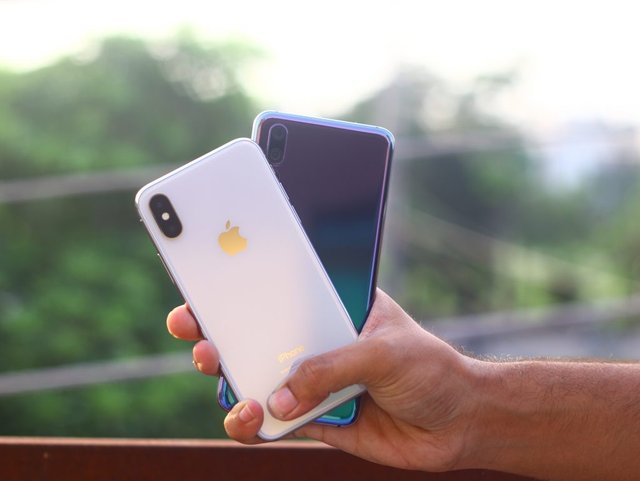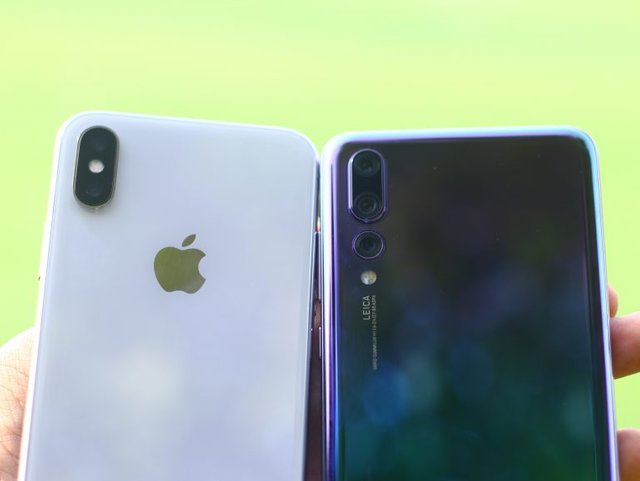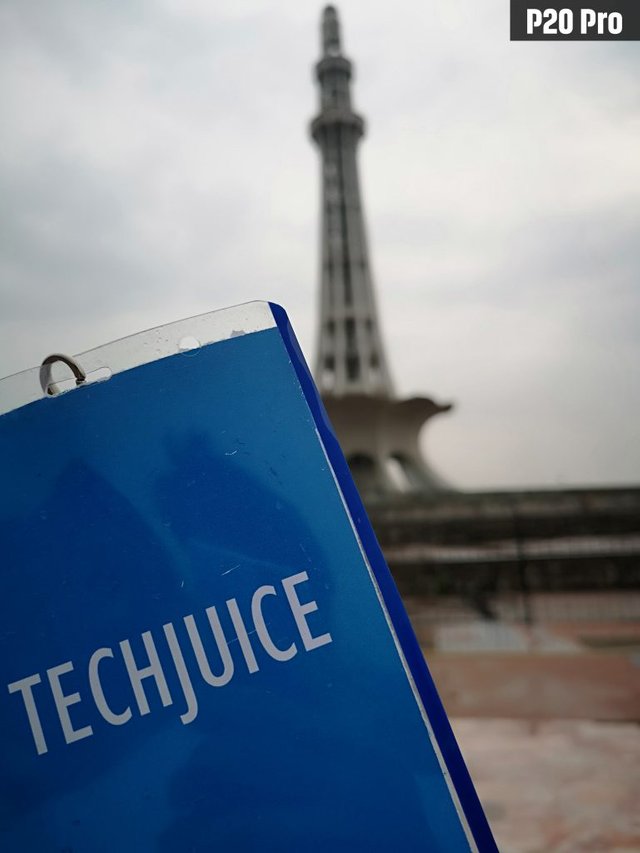Here is why I think Huawei’s P20 Pro is better than the iPhone X
The iPhone X remains one of the most talked-about phones in 2017 and 2018. The iPhone X has been Apple’s main source of revenue for the entire year and is the first phone to set off the bezel-less trend. To compete with the iPhone X, the Chinese smartphone giant Huawei launched the P20 Pro, a phone with almost the same technical specifications. The P20 Pro launched with a triple-lens camera setup on the back, making it the first smartphone to come with this setup. Soon, other Android manufacturers followed suit.
However, most of them went in vain since the industry’s pioneer/trend-setter captured most of the market soon within its launch. On the other hand, the iPhone X, with its A11 bionic chip and amazing bezel-less display manages to impress the average user to quite a significant extent. Sadly, only the average user. Being a technology and specifically a smartphone geek, I’ve found the P20 Pro to be better than the iPhone X.
Here’s how:
The overall look of the phone

The overall look of the phone consists of the body, the rim around the body and other design elements that make up the exterior of the phone. Let’s start off with the iPhone X:
The iPhone X has a glass back paired with a stainless steel rim surrounding the glass.
The model I had was silver and boy, the phone’s look amazed me beyond words. The iPhone X’s back is elegantly labeled with the symbolic Apple and slightly above the Apple comes the dual-lens camera.
To act as icing on the cake, a small text is placed in the bottom half of the phone’s back, spelling out “iPhone”.
God, the feeling this phone gives is absolutely out of this world.
To further seal the deal, the social acceptance factor associated with iPhones in Pakistan is really high and this case is no different. Being the owner of an iPhone X is a statement of its own!
On the front, the iPhone X has a 5.8-inch display with narrow bezels around the sides and front of the phone. Oh and, how could I forget the much-loved notch? The notch is hardly observable when the screen is powered off. Turn it on though, poof. I don’t know about you, but seeing the notch each time I turned the phone on gave me a feeling of disgust and made me ask myself: What in the name of God was Apple thinking?
You create a masterpiece of a phone, you gift it with the best display in the industry and in the end, you slap a notch on It; Apple, why?
Now, let’s get to the P20 Pro. The glass back of the phone shocked me beyond words. You’re charging Rs.99,999 (really cheeky, Huawei, but I doubt people are buying the whole mental manipulation effort) for a phone which looks like one of its cheaper siblings. I got the P20 Pro in the Twilight shade thinking it would be something rare but little did I know that there is a reason it’s rare!
I put the P20 Pro and Huawei’s Mate 10 Lite and I could hardly tell the difference between the two.
The Twilight shade paired with the stainless steel rim around the phone made an awkward color combination.
Do note though that the steel rim is really useful in increasing the phone’s grip when you hold it without a cover. Anyhow, despite this, there’s no denying that the P20’s back camera changes the phone’s feel entirely and manages to give a premium feel which is enough to alter your opinion about the phone. Well, it at least it changed mine.
On the front, the P20 has a significant amount of bezel on the bottom thanks to the fingerprint sensor which also doubles as a home button when the phone is unlocked. The 6.1-inch display runs from the fingerprint sensor up to the top of the phone, which I might add, has a notch as well. Luckily though, the size of the phone makes the notch a tad bit unobservable.
Besides, the P20 lets you turn the notch off. Well played, Huawei.
On a side note though, the glass backs of both the phones are prone to smudges and that ruins the look of both of them. I guess that’s what you have to bear with all glass-backs, right?
Verdict: The iPhone X wins. The glass back paired with the stainless steel rim makes the phone looks amazing and the P20’s glass back simply can’t compete.
Camera
Both Apple and Huawei boast their smartphones’ cameras. iPhone X’s camera was awarded a score of 97 by DxOMark, which is a leading authority for the testing and rating of smartphone cameras. To give you a perspective, the Mate 10 Pro has the same rating. If it wasn’t obvious already, the iPhone X doesn’t even come near the P20 Pro, which has a rating of 109!
But I’m not a guy who goes on statistics. I’m outgoing and this habit of mine forced me to go out, to test the cameras of both the phones. So, one fine June morning, I took a friend and went out to capture the scenes in Old Lahore.
It had been raining in Lahore for two days and that morning was no different. A light drizzle made the usually-hot June weather bearable for us. Upon reaching Old Lahore, we went straight to Minar-E-Pakistan, which is situated in the Greater Iqbal Park. We were greeted by the lush green grass complemented by the unfortunate puddles of water here and there. Anyways, without any further ado, let’s take you through the snaps taken during my visit:




The P20 Pro’s camera manages to take exhilarating shots in almost every lighting condition. The bokeh effect increases the appeal of every photo to a significant extent.
As seen in the photos above, the P20’s shots provide clear details of what’s being shot without overly pixelating the image. This doesn’t mean that the iPhone X is absolutely useless though. The X’s portrait mode shook me beyond words. The immense quality of focus on one object paired with the perfection in blurring out the background gave the image an absolutely amazing touch.
Verdict: Out of the comparison, the P20 wins in most scenarios, thereby making it the obvious victor.
Battery Life
I’m a social media freak. I’m on Snapchat, Instagram, and Facebook almost every minute of the day. Sadly, all of these apps are battery intensive, especially Snapchat, which continuously runs in the background. These requirements mean that I need phones with long battery lives and sadly, the iPhone has disappointed me greatly.
Referencing to my visit to Old Lahore once more, I charged both the phones overnight that day, meaning both of them were at 100% when I left my home. The Huawei P20 Pro lasted till 10 PM that night while I had to put the iPhone X on charge at 3 PM sharp.
The X’s battery almost died out within 8 hours while the Pro lasted roughly 16 hours.
Again, this is while both phones were running 4G LTE connections simultaneously while I repeatedly used Snapchat to capture the beautiful scenery of Old Lahore. While the iPhone X provides no estimate of the remaining time on the current battery charge, the P20 does, and this is how much the phone can last on a charge of 74%:
Verdict: The battery capacities of both phones differ significantly. The iPhone X has a battery capacity of 2716 mAh while the P20 has a capacity of 4000 mAh. While this makes the comparison a tad bit unfair, Apple should’ve put a larger battery in the X considering it’s their flagship. So, the P20 wins once more.
Charging speed
I like going out and I don’t own a powerbank. This provokes the need for fast charging extensively and sadly the iPhone X’s charging doesn’t fulfill my requirements at all. The P20 Pro comes with a fast charger from the factory while you have to buy a separate fast charger for the iPhone X, a 30W power brick which costs $49, the equivalent of roughly Rs. 6500. Additionally, you’re going to have to buy a separate USB-C to Lightning cable which starts from $19.
Putting it side by side, the P20 Pro takes roughly 80 minutes to get from 0 to 90 while the iPhone X takes more than 150 minutes.
So, it goes without saying that you’re probably better off buying the iPhone X if you’re indoors most of the times or you have a powerbank on you all the time. But then again, most people do not like the idea of keeping their powerbanks charged all the time, so this argument isn’t really valid.
Verdict: The P20 Pro takes the obvious win here. The iPhone X’s charging speed in itself is not fast enough and normal users like me obviously wouldn’t like the idea of splashing more money over a separate fast charger after spending more than Rs.120000 for the phone itself.
Display
The iPhone X has a 5.8-inch display with minimal bezels surrounding it, except the top of the screen where the notch is present. The X’s display is a Super AMOLED capacitive touchscreen, which is manufactured and supplied by Samsung. The display has a resolution of 1125×2436 pixels. Additionally, it has 3D touch support as well. But, we don’t care about the technical specs, do we? Let’s get to the usage.
Within two days of usage, the iPhone X’s display started showing scratches.
Despite Apple’s claim of the X’s display being scratch resistant, the display had clearly visible scratches. This upset me beyond words as this is not what you’d expect from a phone which costs Rs.120000.
The X’s notch has caused a significant amount of inconvenience for me. While using Snapchat, there’d be numerous occasions when I couldn’t see the full username of someone I’m chatting with. In other instances, the notch would come in between contact names while I text message etc.
One nice feature is TrueTone, which adjusts the screen temperature according to the environmental conditions. This made usage quite easy when I moved to a dimly-lit room from my home’s well-lit living room. Overall, I don’t think the X’s display is special or unique and I hardly felt a difference between the output of the iPhone X and the iPhone 8 Plus (minus the obvious notch).
Coming to the P20, the 6.1-inch display has wowed me beyond words. The size of the screen made video-viewing an absolute pleasure.
1080p videos on YouTube run like a charm.
Additionally, I loved how responsive the display is. Opening Snapchat and then opening Instagram followed by WhatsApp or Facebook was an experience of its own, to be very honest. The virtual keys placed on the bottom enable quick navigation through apps, courtesy of the home button and the current-apps feature which allows you to switch apps simultaneously without much effort. To my utter joy, the P20’s screen hardly showed any sign of usage throughout the week (pfft, Apple, please learn a thing or two).
Verdict: While the iPhone X’s display has been praised by users in the past, I fail to find any feature which puts the X above its competition. Thereby, I’m afraid the P20 wins. Again.
Face Unlock and Biometrics
Boy, when the iPhone X was announced, its Face ID got the entire industry talking. The fancy talk about 300 data points based 3D face recognition was the talk of the town and I honestly don’t see why. I found the X’s Face ID to be extremely sleazy and slow.
It failed to unlock the phones in 4 attempts out of 10.
While this might not seem like a big figure, expectations are usually high in the case of Apple products considering their stature and sadly they failed to fulfill my expectations this time around.
To further worsen matters, the iPhone X does not have a fingerprint sensor, meaning the only biometric unlock feature you have is the face unlock. Things got really awkward while trying to use the X while on a bike. People stared at me as if I’m naked and believe me that feeling is DEFINITELY not something you’d like. To put the nail in the coffin, you’re required to swipe up after the phone gets unlocked using Face ID. Why, Apple, why?
As opposed to that, the P20 has both a Face Unlock feature along with a fingerprint sensor.
The P20’s Face Unlock is the best I’ve ever seen. It hardly takes a quarter of a second to unlock the phone, even in dim-light conditions
After using the iPhone X’s Face ID, the P20’s Face Unlock felt like a blessing.
I feel absolutely no hesitation in using the P20’s Face Unlock whenever I’m out. I actually showed off the Face Unlock’s efficiency in front of all my friends and peers and I can testify that none of them spoke against it.
To further sweeten the deal, the P20’s fingerprint sensor is extremely smooth. It manages to unlock the phone within a blink of an eye and it is extremely handy whenever I don’t want to bring the phone up to my face, such as when I wake up from sleep and start to use the phone while lying down. If I had to make one complaint against the P20, it’s the fact that it doesn’t allow me to use the fingerprint sensor whenever I’m holding the phone up – that’s how fast its Face Unlock is.
One more feature that I love is the App Lock on the P20. Access to apps can be restricted using your fingerprint along with a pin code that is different from your phone’s unlock pin. I love the feature since my phone is in the hands of others quite often and frankly I hate the idea of people peeking through my stuff.
Verdict: This is a clear victory for the P20. The iPhone X doesn’t even come near the P20 in this regard. If I could address Apple right now, I’d have one thing to say: The run for a bezel-less display is useless unless you ensure user convenience in the biometrics section.
OS and interface
The P20 Pro is powered by Android Oreo 8.1.0. Paired with the 6 GB of RAM, the Oreo software gives a phenomenal experience. Again, I’ll bring light to the fact that I’m a social media freak. I have to switch between various apps on the go and the P20’s navigation keys help a lot in doing this.
As an example, I was able to switch between apps an amazing 40 times within a minute. This doesn’t include usage and is based on switching between dormant apps only.
Moreover, the P20’s recent apps feature helps in switching between the two most recent apps at a tap of a button. Just tap the recent apps key on the navigation bar twice to switch between the current app and the other most recent app.
On the other hand, the iPhone X’s iOS is quite a headache. The iPhone X requires you to swipe up after it unlocks and similarly, you have to swipe up in order to bring you to the home screen when you’re using an app.
To switch between apps, you have to swipe up and wait for a second or two to bring up the recent apps. This might sound easy but it’s actually pretty inconvenient when you start using the phone regularly. I would happily swap the swiping up thing with a proper navigation bar but then again, iOS is King, right? Sigh.
Verdict: The P20’s EMUI 8.1 paired with Android 8.1 enables quick navigation between apps and that is the only thing I need to crown the P20 as the victor here.
Processing Speed
I conducted benchmark tests on both phones and I’ll let the tests do the talking here. These are the results.
Here is the iPhone X
In these numbers, the iPhone X is miles better than the P20 Pro. However, benchmark tests are only a rough depiction of a phone’s performance and thus a true conclusion cannot be derived from it. It is worth mentioning that the Hisilicon Kirin 970 chipset powering the P20 is not as efficient as the iPhone X’s A11 Bionic chip, so Apple takes the win here.
Verdict: Going by the numbers while considering the fact that the Kirin 970 is simply not as good as the A11 bionic chipset, the iPhone X wins this. After all, the Cupertino giant won’t let a simple Android overpower its performance, right?
Default Apps
This is probably the most annoying thing about the P20 Pro. There are way too many pre-installed apps on the phone. Furthermore, the phone keeps on installing random apps without being prompted to do so. For example, it installed Netflix and Amazon Video on my phone even though I don’t use these apps. Apps like Z Camera and TrueCaller come pre-installed as well and I have only one question: Why? I’m sure users are capable of installing apps themselves and they don’t need your assistance.
Apple doesn’t load up its iPhone X with many apps. The few that are included can be uninstalled in a breeze. That isn’t the case with the P20 as many of these pre-installed apps cannot be uninstalled.
Verdict: The iPhone X wins this, hands down. Yay, Apple (?)
Speakers
Whenever I’m out with friends and sitting in a café etc., I use my phone to lighten the scene with music. In this regard, the iPhone X has been my best companion. The iPhone X’s stereo speakers manage to light up the situation every time.
The P20 Pro, although not that bad, fails to match the X in this regard. The P20’s speakers’ audibility is significantly lower than the X’s, which is quite a pity, to be honest.
Verdict: If you’re an audiophile, the P20 is definitely not for you. The iPhone X wins this by a mile.
Final Verdict
Keeping all the above in mind, I feel like the P20 is better than the iPhone X. The P20’s crisp display and quick navigation features overwhelm me to quite an extent and that is very, very rare. While the iPhone X’s pure-glass back paired with the factor of society acceptance fights hard against my verdict, I feel like the phone itself falls behind the P20 Pro.
Congratulations, Huawei, you just won my heart! What about yours? Give the P20 a try!